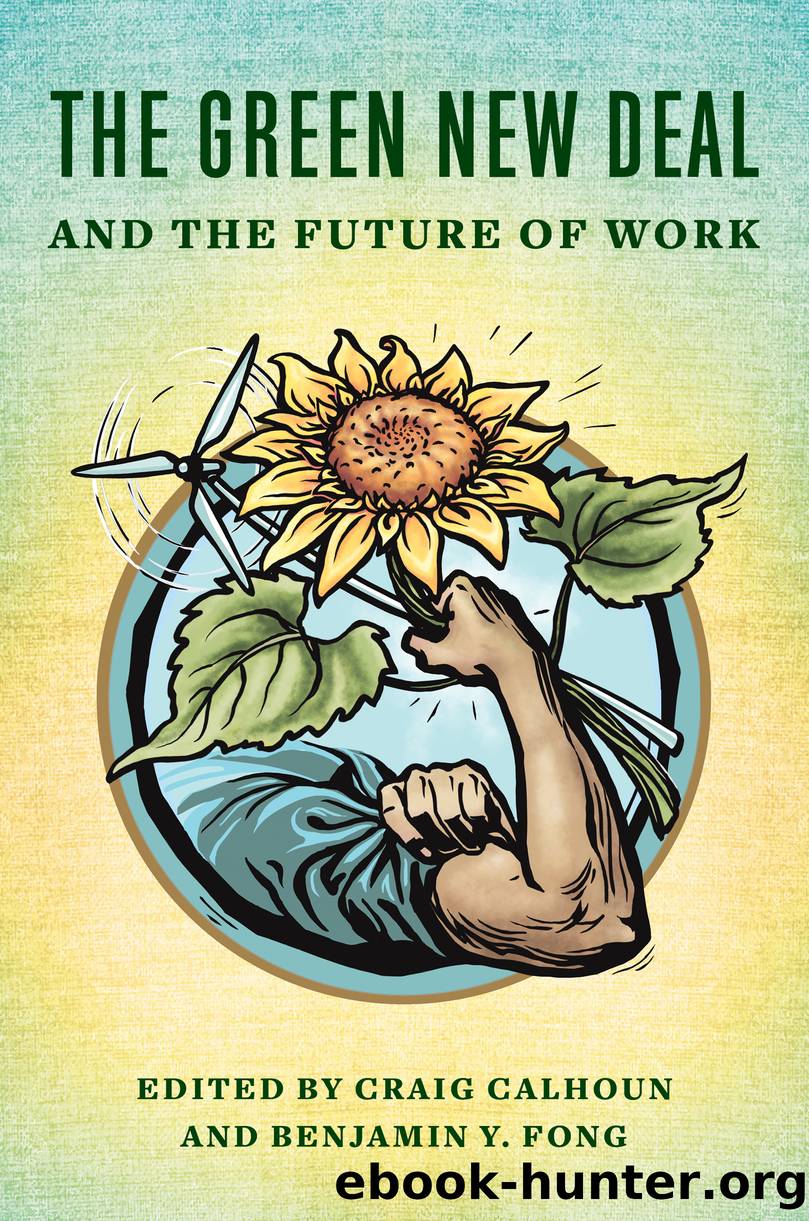The Green New Deal and the Future of Work by Craig Calhoun

Author:Craig Calhoun
Language: eng
Format: epub
Publisher: Columbia University Press
Just Transition for Whom?
Transitioning away from the current fossil fuelâbased economy will require considerable economic changes, including large shifts in employment away from extractive industries and toward new green technologies. This transition will directly impact the jobs and livelihoods of tens of thousands of workers in the fossil fuel industry and indirectly affect just as many workers in related sectors such as transportation and electricity generation and transmission. New jobs created by the transition will likely require different skills and temperaments and will likely be in different geographic locations than the old fossil fuel jobs. Without intervention, the switch from fossil fuels to renewable energy will also signal a decline in traditionally unionized occupations and a shift toward jobs where unions have not yet flourished, amounting to an overall decline in bargaining power for workers in a period of already historically low levels of unionization. To illustrate this disparity in bargaining power, consider that the national average income for natural gas plant operators is $78,000 annually, while rooftop solar installers earn an average salary of just $46,000 (on the gendered nature of this disparity, see chapter 4 by Alyssa Battistoni in this volume).11
At the same time, as a result of the legacy of racism and discriminatory hiring practices in the United States, workers from historically marginalized communities, particularly Black and Latinx workers, have often been systematically deprived of opportunities to share in the prosperity generated by the extractive economy. Adding insult to injury, these same workers have disproportionately born the burden of the pollution created by the fossil fuel industry. For example, a recent study in the Proceedings of the National Academy of Sciences found that air pollution exposure in the United States is disproportionately caused by the non-Hispanic white majority but disproportionately inhaled by Black and Hispanic minorities.12 On average, non-Hispanic white people experience a âpollution advantageâ of about 17 percent less air pollution exposure than is caused by their consumption, while Black and Hispanic people on average bear a âpollution burdenâ of 56 percent and 63 percent excess exposure, respectively.
So when asked âjust transition for whom?â the answer should be âjust transition for all.â First, without a strong guarantee of social protections and good jobs, fossil fuel workers will be fierce opponents to legislative efforts to decarbonize the economy. Second, it is not difficult to see why climate justice activists from frontline communities would be hesitant to support just transition plans focusing exclusively on helping the well-paid fossil fuel workers when their community members were not only denied a fair chance to work on those jobs but also disproportionately suffered the health impacts resulting from them. Of course it is an oversimplification to think of these two groups as entirely separate and mutually exclusive. We know climate change harms everyone, and we know the working class is multiracial; therefore, for pragmatic reasons, climate solutions must address the concerns of those workers facing displacement. However, the patterns of inequality in access to economic opportunity and exposure to environmental burden
Download
This site does not store any files on its server. We only index and link to content provided by other sites. Please contact the content providers to delete copyright contents if any and email us, we'll remove relevant links or contents immediately.
Rich Dad Poor Dad by Robert T. Kiyosaki(6632)
Bad Blood by John Carreyrou(6621)
Principles: Life and Work by Ray Dalio(6446)
Playing to Win_ How Strategy Really Works by A.G. Lafley & Roger L. Martin(6303)
Management Strategies for the Cloud Revolution: How Cloud Computing Is Transforming Business and Why You Can't Afford to Be Left Behind by Charles Babcock(4572)
The Confidence Code by Katty Kay(4260)
Thinking in Bets by Annie Duke(4226)
American Kingpin by Nick Bilton(3886)
Delivering Happiness by Tony Hsieh(3425)
Project Animal Farm: An Accidental Journey into the Secret World of Farming and the Truth About Our Food by Sonia Faruqi(3221)
The Power of Habit by Charles Duhigg(3139)
The Tyranny of Metrics by Jerry Z. Muller(3072)
The Marketing Plan Handbook: Develop Big-Picture Marketing Plans for Pennies on the Dollar by Robert W. Bly(3062)
Brotopia by Emily Chang(3053)
Mastering Bitcoin: Programming the Open Blockchain by Andreas M. Antonopoulos(3042)
I Live in the Future & Here's How It Works by Nick Bilton(2997)
The Content Trap by Bharat Anand(2924)
Building a StoryBrand by Donald Miller(2912)
Applied Empathy by Michael Ventura(2902)
